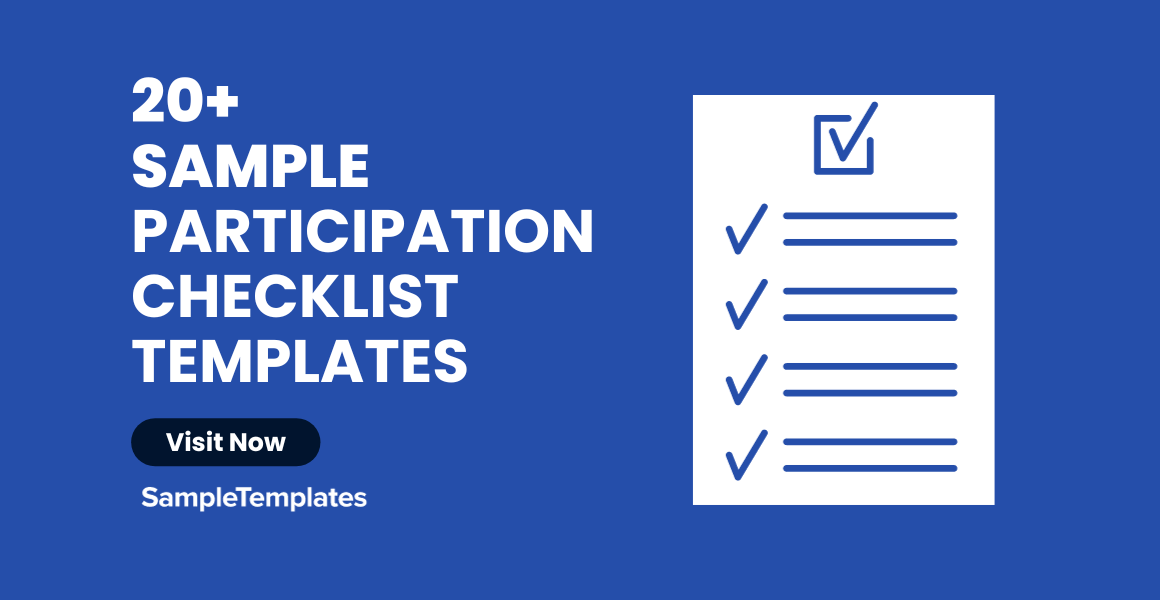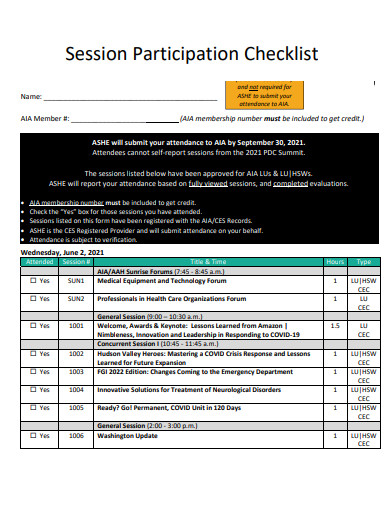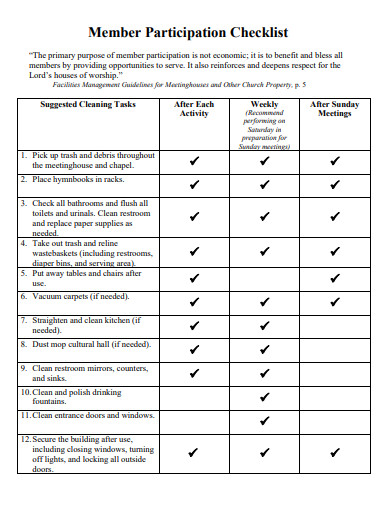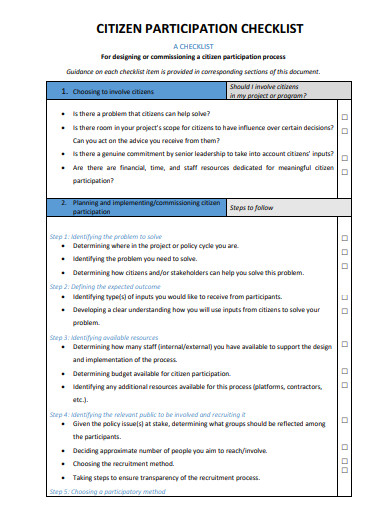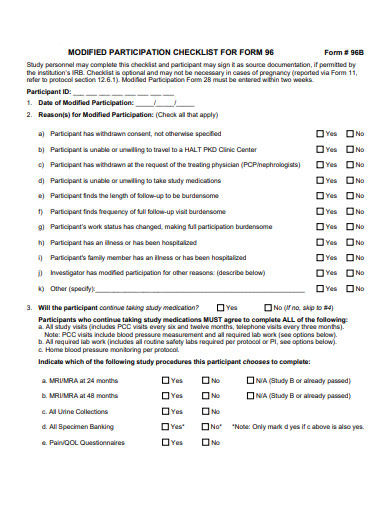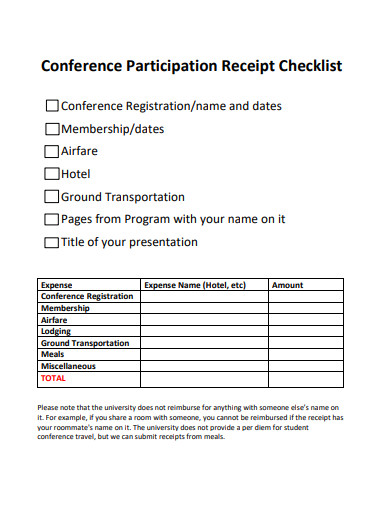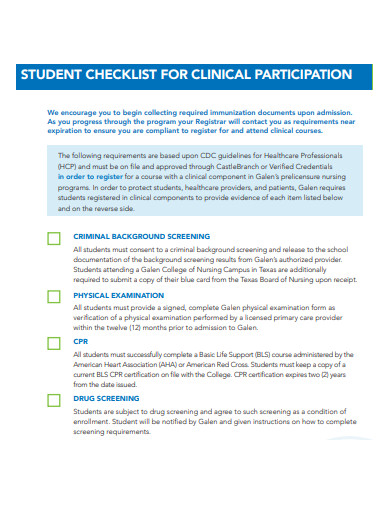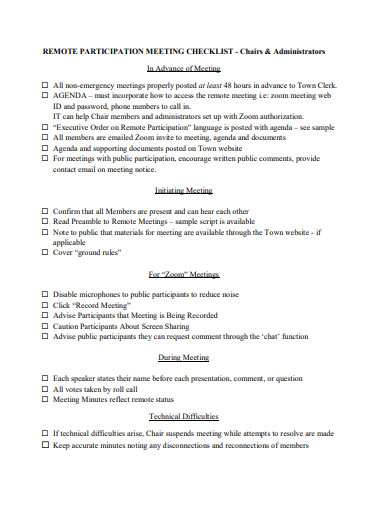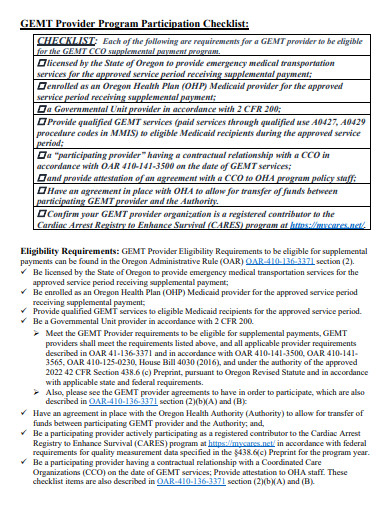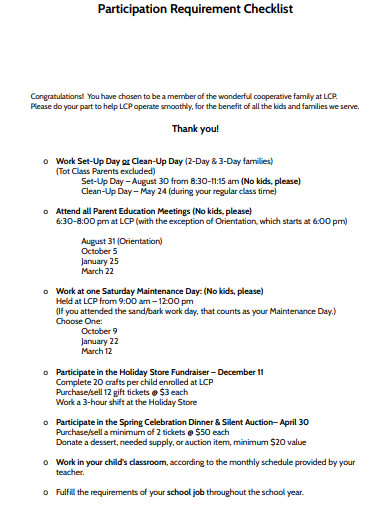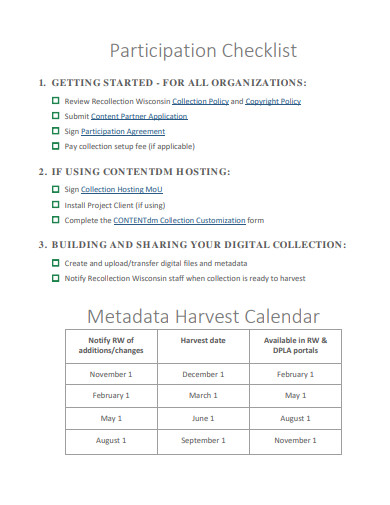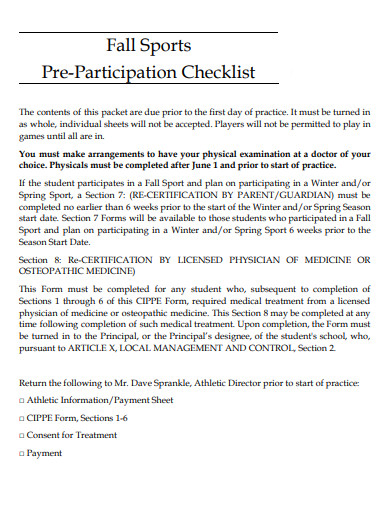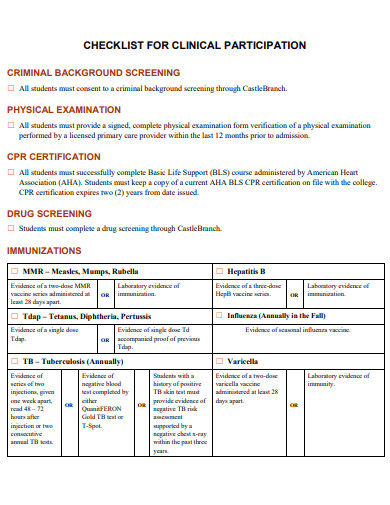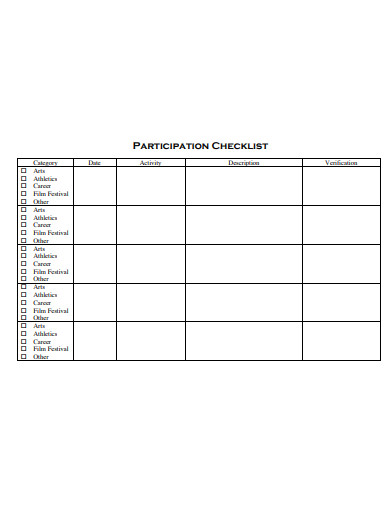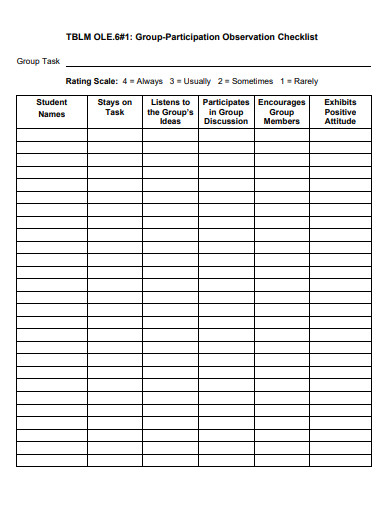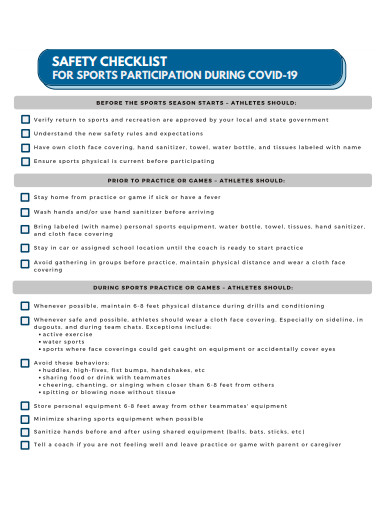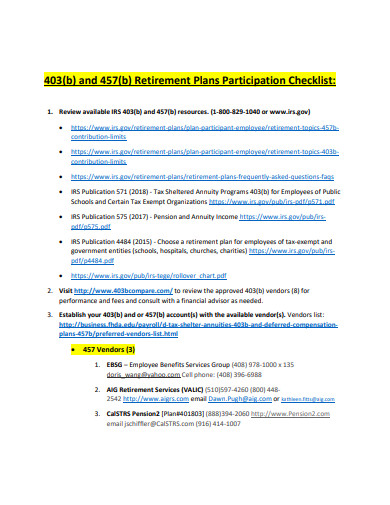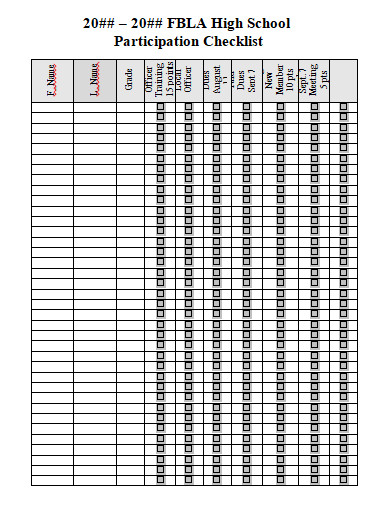In today’s fast-paced world, ensuring active involvement is crucial. The “Participation Checklist” serves as a comprehensive guide, designed to enhance engagement in any sample event or activity. Packed with essential items and insights, this tool ensures nothing gets overlooked. Perfect for event organizers, educators, or team leaders, this checklist ensures every voice is heard, elevating the quality and inclusivity of interactions. Dive in to discover a sample roadmap to optimized participation, making every gathering or session productive and memorable.
20+ Participation Checklist Samples
1. Sample Checklist Template
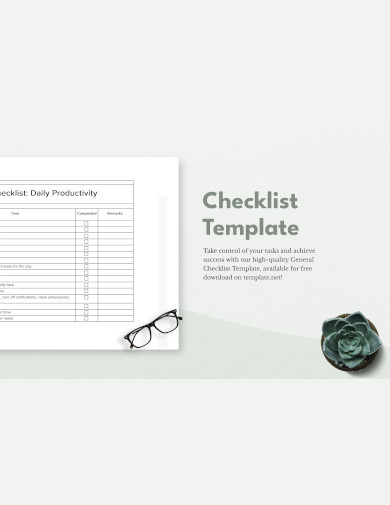
2. Basic Checklist Template
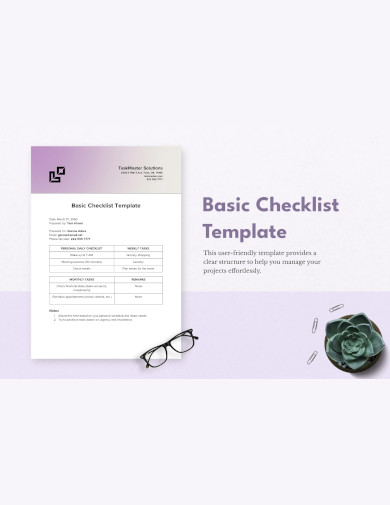
3. Formal Checklist Template
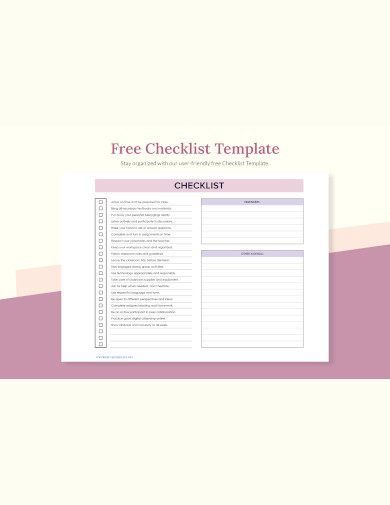
4. Printable Checklist Template
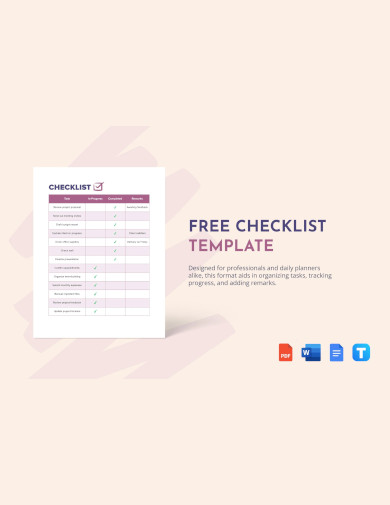
5. Session Participation Checklist Template
What is a Participation Checklist?
A Participation Checklist is a structured tool used to ensure that all necessary stakeholders analysis or participants are involved in a specific activity, project, or event. Its primary goal is to ensure that everyone who needs to be engaged or informed is accounted for. In many scenarios, overlooking a single participant can have significant repercussions, affecting the success and efficiency of a project.
Origin and Significance
While the concept of making sample lists dates back centuries, the importance of a checklist designed specifically for participation has grown in tandem with the complexity of modern projects and organizations.
- Modern Complexities: As businesses and projects grow in size, the number of stakeholders also increases. A checklist ensures that no one is left out.
- Diverse Teams: With the advent of request remote work and global teams, ensuring everyone is on the same page is more vital than ever. A Participation Checklist can bridge these geographical and time zone gaps.
Components of an Effective Participation Checklist
For a Participation Checklist to be effective, it needs to be more than just a list of names. Here are some components that can make a checklist truly useful:
- Role Definition: Besides listing participants, it’s beneficial to define their roles and responsibilities. This ensures that every aspect of the project has an owner or a stakeholder looking after it.
- Contact Information: Especially in larger teams, it’s handy to have contact details alongside names. This facilitates quick communication when needed.
- Status Columns: Adding columns to track participation status (like “Confirmed,” “Pending,” “Declined”) can help organizers manage participation actively.
- Feedback Loop: Allow space or a method for participants to provide sample feedback. This can help in refining future checklists or understanding areas of improvement.
Key Features of an Effective Participation Checklist
Every checklist can be tailored to specific needs, but some universal features can enhance its effectiveness:
- Clearly Defined Roles: Every participant should have a clear understanding of their role and responsibilities.
- Timelines: Attach a simple timeline for each participant’s tasks or involvement, ensuring a synchronized workflow.
- Priority Marking: Not all participants may be required at all stages. Marking out when and where each participant is crucial can help in resource allocation.
- Feedback Mechanism: A space for participants to provide their input or raise concerns can be beneficial for continuous improvement.
Incorporating the Participation Checklist in Your Processes
To get the most out of this tool:
- Make it Accessible: The checklist should be easily accessible to everyone involved. Consider using collaborative platforms where multiple team members can view and update in real-time.
- Regular Updates: As projects evolve, so might the list of participants. It’s essential to revisit and update the sample checklist periodically.
- Feedback: After the conclusion of a project or sample event, gather feedback on the effectiveness of the Participation Checklist. Understand what worked and what didn’t, and refine for future use.
Benefits Beyond the Obvious
While the primary benefit is ensuring all stakeholders are involved, there are some secondary benefits:
- Enhanced Collaboration: When everyone knows their role and sees the bigger picture, collaboration becomes more seamless.
- Conflict Resolution: A clear checklist can help identify potential areas of conflict and address them proactively.
- Increased Ownership: Participants, when listed and assigned specific roles, are likely to take more ownership and responsibility.
Challenges and Solutions
While the Participation Checklist is a potent tool, it’s not without challenges:
- Over-inclusion: The risk of adding too many participants, leading to decision paralysis. The solution lies in meticulous role definition and prioritizing.
- Static Nature: Projects evolve, and so should the checklist. It’s crucial to revisit and update it regularly.
6. Member Participation Checklist Template
7. Sample Citizen Participation Checklist Template
8. Modified Participation Checklist Template
9. Conference Participation Receipt Checklist Template
10. Clinical Participation Student Checklist Template
11. Remote Participation Meeting Checklist Template
12. Provider Program Participation Checklist Template
13. Participation Requirement Checklist Template
14. Simple Participation Checklist Template
15. Pre-Participation Checklist Template
16. Clinical Participation Checklist Template
17. Participation Checklist Format
18. Group-Participation Observation Checklist Template
19. Sports Participation Safety Checklist Template
20. Retirement Plans Participation Checklist Template
21. High School Participation Checklist Template
Why Use a Participation Checklist?
Using a Participation Checklist is beneficial for several reasons:
- Ensures Comprehensive Engagement: By having a predefined list, organizers can ensure that they have not inadvertently overlooked anyone. This is especially critical in larger teams or projects with multiple departments involved.
- Improves Communication: When everyone is included from the onset, there’s a reduced risk of miscommunication. Everyone is on the same page from the beginning, eliminating the need for catch-up meetings or last-minute adjustments.
- Facilitates Better Planning: Knowing who is involved can aid in resource allocation, setting up meeting times, and understanding the different perspectives that need to be considered.
- Accountability and Transparency: A checklist allows for a clear record of who should be involved. This can be vital for post-project reviews or in scenarios where stakeholder involvement is mandated by regulations or company policies.
How do you Create a Participation Checklist?
Involving stakeholders, whether they are team members, community contributors, or event attendees, is vital for the success of any project or event. A participation checklist ensures that everyone who needs to be involved is not only included but also actively engaged. You can also see more templates like Meeting Checklists. Let’s delve into the step-by-step process of creating a comprehensive participation checklist.
Step 1: Identify Your Audience
Every checklist begins with understanding whom it’s intended for. Who are the participants you aim to engage? Depending on your project or event, this could be members of a team, community residents, stakeholders, or even attendees of an event. For instance, if you’re organizing a community cleanup day, your audience might include local residents, council members, and even local businesses.
Step 2: Define the Modes of Participation
Once you have your audience in mind, think about the different ways they can participate. Participation can be active, like giving a sample presentation, or more passive, like attending a webinar. For the community cleanup example, modes of participation might include: donating supplies, volunteering to clean specific areas, providing refreshments, or promoting the event.
Step 3: Detail Specific Actions and Requirements
Break down each mode of participation into actionable tasks and sample outline any requirements or prerequisites. This ensures clarity in expectations and allows participants to prepare adequately. For the cleanup day, if volunteering to clean a specific area is a mode of participation, detailed actions might involve signing up for a particular spot, attending a brief training session, or ensuring they have appropriate clothing.
Step 4: Set Clear Timelines and Milestones
To ensure seamless participation, it’s crucial to have clear timelines. When should participants sign up by? If there’s a training or orientation, when is it scheduled? For our community cleanup, you might set a deadline for volunteer sign-ups two weeks before the event, and schedule training sessions the weekend prior. These milestones make sure participants know when they need to take action.
Step 5: Distribute, Communicate, and Follow Up
Once your checklist is ready, it’s time to share it! Use appropriate channels to distribute your checklist, whether it’s via email, social media, or community bulletins. Communication is key, so ensure participants have a point of contact for any questions or concerns. Moreover, following up is crucial. Sending reminders as deadlines approach or checking in with participants to confirm their involvement can make a big difference in the success of your participation efforts.
In Conclusion, The Participation Checklist is more than just a list; it’s a strategic tool that can transform the way projects and events are managed. By ensuring every stakeholder’s active participation, it fosters collaboration, efficiency, and success. Whether you’re a seasoned manager or just starting, integrating this checklist into your processes can lead to more streamlined and inclusive operations. You can also see more templates like Monthly Checklists.
Related Posts
FREE 17+ Survey Checklist Samples in MS Word | Google Docs | PDF
FREE 18+ Internship Checklist Samples in MS Word | Google Docs | PDF
FREE 18+ Statement Checklist Samples in MS Word | Google Sheets | PDF
FREE 20+ Voluntary Checklist Samples in MS Word | Google Sheets | PDF
FREE 18+ Summary Checklist Samples in MS Word | Google Sheets | PDF
FREE 14+ Sponsorship Checklist Samples in MS Word | MS Excel | PDF
FREE 18+ Conference Checklist Samples in MS Word | Google Sheets | PDF
FREE 17+ Lesson Checklist Samples in MS Word | Google Sheets | PDF
FREE 18+ Progress Checklist Samples in MS Word | Google Docs | PDF
FREE 18+ Enrollment Checklist Samples in MS Word | Google Docs | PDF
FREE 18+ Graduation Checklist Samples in MS Word | Google Sheets | PDF
FREE 15+ Consent Checklist Samples in MS Word | Google Sheets | PDF
FREE 18+ Review Checklist Samples in MS Word | Apple Pages | PDF
FREE 18+ Submission Checklist Samples in MS Word | Google Docs | PDF
FREE 18+ Request Checklist Samples in MS Word | MS Excel | PDF
